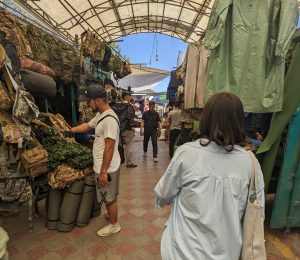Kyrgyz President Sadyr Japarov threatened in an interview to enact a government takeover of markets if protests don’t stop, a day after kicking new regulations back by six months. Vendors in Kyrgyzstan’s bazaars have been protesting since late November over looming regulations that would mandate cash registers and reports on sales for the purposes of calculating and paying sales taxes.
Anyone who has been to a Kyrgyz bazaar knows: Prices are set by bartering and there aren’t any receipts.
On November 11, the Kyrgyz State Tax Service posted a list of 12 types of businesses and a reminder that the existing system — in which they paid a flat fee to operate — would cease to be as of January 1, 2024. The list included a comprehensive range of commercial activities, from markets and stores to shopping centers, auto-part dealers, food vendors, bakers, and even artists. The looming regulation sparked protests in all of Kyrgyzstan’s major cities, where bazaars form a central part of trade and life.
On December 5, Japarov went to Bishkek’s largest bazaar, Dordoi, where an estimated 1,000 people had rallied. After speaking with market vendors he announced the postponement of the new regulations until July, noting the “unpreparedness” of the tax service. In his remarks, Japarov argued in favor of the tax reforms, noting that the state can only replenish the treasury and “lift up the country” through taxes and customs. He made the case that salaries can only be raised if the state is able to keep tabs on money and extract tax revenue. He also underscored that small businesses would not face taxes, but that it was necessary to know how much was being made, and what goods were being sold.
Kyrgyzstan, according to Chairman of the Cabinet of Ministers Akylbek Japarov (no relation to the president), is the only country in Central Asia not to use electronic invoices. Indeed, the country has been trying to get its Electronic Invoice Note system (ETTN) up and fully running for more than a year with halting progress. It has been in place for the oil industry since May 2022 but was supposed to be expanded to cover all economic activity.
In November 2022, the Kyrgyz State Tax Service declared that on January 1, 2023, those involved in selling goods would need to issue e-invoices. In May new requirements followed mandating that all taxpayers use e-invoices, with the stipulation that those using cash registers with annual revenue below 8 million Kyrgyz soms would be exempt.
This effort at fiscalization runs headlong into public distrust of the government, the preferences of invested interests, and related issues of corruption. On the one hand, there’s a need to modernize Kyrgyzstan’s tax system, to move it into the present century and tackle the shadow economy for the betterment of the whole state. That said, however, there is clearly a deficit of trust between Kyrgyz and their government. There is good reason to believe that the average person won’t see a dime of improvement in their own lives by giving more money to the state. Some of Kyrgyzstan’s most corrupt have been government officials, and efforts to tackle corruption have proven convenient for political sniping but largely fail to address corruption writ large.
Japarov, in his interview with Kabar, tried to draw a line in the sand, arguing that the government will allow people to legalize the properties and sums they’ve perhaps previously hidden and move forward under the law — suggesting that this is some of the hesitation in adopting modern accounting techniques. We’ve seen this before in the phenomenon known as kusturizatsia. In a bit of bravado, Japarov promised to go first: “I’m going to start it myself. Soon you will know how many properties I have.”
Japarov alleged in his remarks at Dordoi that unnamed forces were using the merchants as weapons, hoping for yet another revolution in Kyrgyzstan. Vendors who spoke to RFE/RL rejected that accusation.
After pushing the deadline back in his Dordoi appearance, Japarov responded to a question from Kabar as to whether those who encouraged people to protest would go “unpunished.” He said, “If they continue to rally like this, we will solve their problem in five seconds. On behalf of the Government, we will introduce external management to the markets, just as external management was introduced to Kumtor.”
Kumtor, a formerly Canadian operated gold mine, was nationalized by Japarov’s government in 2021 via an “external management” mechanism.
In some ways, the progress of this issue mirrors that of the Kempir-Abad matter in which the failure of Bishkek to adequately explain its policy decisions, and their impact on people, leads to public protests. In the Kempir-Abad case, an arguably favorable border deal became a point of contention, and instead of dealing with the flak the Kyrgyz government jailed the dissenters, accusing them of plotting riots. That surely must cross the minds of those against the fiscalization push.

































